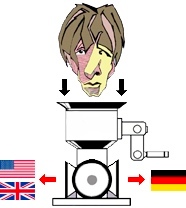| Páginas sobre el tema: [1 2] > | Poll: How many times do you generally proofread your translations? Autor de la hebra: ProZ.com Staff
|
|---|
This forum topic is for the discussion of the poll question "How many times do you generally proofread your translations?".
This poll was originally submitted by Irène Guinez. View the poll results »
| | | | neilmac
España
Local time: 07:30
español al inglés
+ ...
It depends on the text. A lot of the work I do is quite similar and I've been doing it for a long time, so I don't usually need to proofread a lot of my translations more than once. Especially as I check each text segment carefully along the way.
In longer or more complicated texts I also rely on a colleague to check my drafts before going over them again myself before delivering them.
| | | | Jan Truper 
Alemania
Local time: 07:30
inglés al alemán
My translations are generally checked by dedicated proofreaders/reviewers.
I read each sentence after translating it, I spot-check whole passages, I have the computer perform spellcheck and QA, and I make sure that the format is in good order -- but I usually do not proofread the whole text.
If a client wants me to translate AND proofread, I charge 150 % of my translation fee.
[Edited at 2018-12-10 08:42 GMT]
| | | |
I try to create a finished product as a go along, rather than doing a draft. So I re-read each paragraph before I start working on the next one. When the translation is finished, I read the entire document for sense, at which point I usually introduce a number of improvements. Then I run the spelling/grammar check. Finally, I read it one last time for typos.
I learned a long time ago that I can't proofread for sense and typos at the same time.
[Edited at 2018-12-10 09:29 GMT]
| | |
|
|
|
Tansy Tazewell 
Alemania
Local time: 07:30
Miembro 2008
alemán al inglés
After finishing the translation I go through it again on screen in MemoQ. Then I print it out and proofread it sentence for sentence on paper. And finally I sit back and read it for comprehension and flow - as if I were the target reader.
| | | | | It depends... | Dec 10, 2018 |
.. from one to three or more. I’ll go over my translation how many times I feel the text needs even for those clients who thoroughly proofread my work and then send the translation back for my input.
P.S. My very last proofreading step consists of reading out aloud the whole text and I always notice things that I haven’t seen before: sentences that are too long, too repetitive or too convoluted…
[Edited at 2018-12-10 11:28 GMT]
| | | | | It depends ... | Dec 10, 2018 |
… very much on the type and length of text.
The longer you stare at a very small text, the less you see!
So for tiny jobs I try to get them right first time, check for typos, and take a short break. Then if the job stil looks OK, I deliver it, or I make an adjustment and send it off anyway.
I check personal documents a couple of times for accuracy and layout, and that everything really is there! These are often documents I have created from scratch, as the origi... See more … very much on the type and length of text.
The longer you stare at a very small text, the less you see!
So for tiny jobs I try to get them right first time, check for typos, and take a short break. Then if the job stil looks OK, I deliver it, or I make an adjustment and send it off anyway.
I check personal documents a couple of times for accuracy and layout, and that everything really is there! These are often documents I have created from scratch, as the original is a 'dead' PDF scan.
I am currently working on a 6000-word job, which is huge for me! It is a semi-academic paper for a magazine, and I will go through it four or five times to check terminology, consistent spelling, names, and finally to make sure the style is as close as possible to the well-written source text.
In that process I do not necessarily read the whole text at each pass - I use the search function, but I do also read the whole text more than once. ▲ Collapse
| | | |
Jan Truper wrote:
My translations are generally checked by dedicated proofreaders/reviewers.
I read each sentence after translating it, I spot-check whole passages, I have the computer perform spellcheck and QA, and I make sure that the format is in good order -- but I usually do not proofread the whole text.
If a client wants me to translate AND proofread, I charge 150 % of my translation fee.
I'm actually a little shocked by this. But it could explain a lot.
I don't accept review jobs because the translations tend to be so flawed that too much responsibility shifts onto me.
I always thought this was because the translators were morons, or mercenaries, but maybe it's just the modern way, each cog in the machine assigned its very specific task.
But I didn't sign up to work in a factory. I firmly believe that the translator's job is always to produce a 100% finished text. The reviewer is only there to check for the inevitable occasional slip-up.
| | |
|
|
|
Catherine De Crignis (X) 
Francia
Local time: 07:30
Miembro 2012
inglés al francés
+ ...
| Usually twice | Dec 10, 2018 |
Chris S wrote:
I'm actually a little shocked by this. But it could explain a lot.
I agreed with you above but I am not surprised by the "0" answers.
Yes indeed, it does explain a lot!
| | | | Jan Truper 
Alemania
Local time: 07:30
inglés al alemán
| shock and awe | Dec 10, 2018 |
Chris S wrote:
I'm actually a little shocked by this. But it could explain a lot.
I don't accept review jobs because the translations tend to be so flawed that too much responsibility shifts onto me.
I always thought this was because the translators were morons, or mercenaries, but maybe it's just the modern way, each cog in the machine assigned its very specific task.
But I didn't sign up to work in a factory. I firmly believe that the translator's job is always to produce a 100% finished text. The reviewer is only there to check for the inevitable occasional slip-up.
I understand your concern; I do not take on stand-alone proofreading/review tasks for similar reasons, and I have also encountered a lot of moronic work.
I work very diligently from the get-go. I have no way of affirming this, but maybe I spend more time on my texts than other people who include a separate proofreading step.
If my output were so flawed that the reviewer had to do more than fix "the inevitable occasional slip-up", I would change my approach, but this is simply not the case.
There are projects where I communicate directly with the proofreader while he/she is already reviewing the first batches of a text that I am still working on. I have often been told (without having asked) that my work is outstanding, and I don't see any need for reviewers to feign gratitude.
As a side note, my line of work (mainly games and subtitles) does indeed remind me of a factory sometimes; deadlines are often tight and there are many different steps and specialists involved.
| | | |
Jan Truper wrote:
I work very diligently from the get-go. I have no way of affirming this, but maybe I spend more time on my texts than other people who include a separate proofreading step.
You could very well be right there, and I appreciate that this approach might work perfectly well in some areas, so please don't take it personally!
It's just that seeing this approach spelt out in black and white for the first time produced a sudden a-ha moment which explains a lot about some of the translations I used to encounter in areas where it either doesn't work and/or is abused.
| | | | | I ticked once | Dec 10, 2018 |
but actually, depending on the text, it is often twice.
I know that most of the time my translations will be proofread or reviewed by another linguist, but that is not a problem, in fact, it is kind of reassuring.
I too do proofreading/reviewing myself, but rarely take on such jobs from unknown clients.
Most of the translations I see are quite good, and when sometimes they are not, I let the client know, and usually they appreciate my opinion.
Conclus... See more but actually, depending on the text, it is often twice.
I know that most of the time my translations will be proofread or reviewed by another linguist, but that is not a problem, in fact, it is kind of reassuring.
I too do proofreading/reviewing myself, but rarely take on such jobs from unknown clients.
Most of the translations I see are quite good, and when sometimes they are not, I let the client know, and usually they appreciate my opinion.
Conclusions: - When I have done my translation and proofread it conscientiously, I go on to the next project and let the client do with it whatever they want to - as long as i get paid.
- I mostly take on proofreading/reviewing/editing jobs only when I know the client. And generally it works out fine. There are actually good translators out there. ▲ Collapse
| | |
|
|
|
| 2x revision against the original, 1x clean proofreading | Dec 10, 2018 |
The two against the original are done on paper (memoq or trados dual language export); the last proofreading is done on the computer.
I introduced this method a few years ago and it has made a big difference
If the client pays for more, I have an external proofreader as well, but most of my work is done through agencies, so the rate is not high enough for this.
| | | | Mario Freitas 
Brasil
Local time: 03:30
Miembro 2014
inglés al portugués
+ ...
| Twice - two entirely different revisions | Dec 10, 2018 |
In addition to the spelling/grammar/quality checks, which I do not consider a revision, I make two entirely different revisions.
1) The standard revision, starting from the top, when I finish the translation, side by side with the original.
2) On the second round, I close the original document and revise only the translation, as if it were a document originally issued in the target language. This is when you fix the euphony of the translation and make it look like "not ... See more In addition to the spelling/grammar/quality checks, which I do not consider a revision, I make two entirely different revisions.
1) The standard revision, starting from the top, when I finish the translation, side by side with the original.
2) On the second round, I close the original document and revise only the translation, as if it were a document originally issued in the target language. This is when you fix the euphony of the translation and make it look like "not a translation". Text construction and standards in the oringinal language is different than the target language. You can't imagine how much this "rebuild" improves the deliverable. ▲ Collapse
| | | | Mario Freitas 
Brasil
Local time: 03:30
Miembro 2014
inglés al portugués
+ ...
Jan Truper wrote:
My translations are generally checked by dedicated proofreaders/reviewers.
If a client wants me to translate AND proofread, I charge 150 % of my translation fee.
[Edited at 2018-12-10 08:42 GMT]
If you don't take care of the quality of the product you deliver and of your image as a professional, no one else in the whole wide world will.
| | | | | Páginas sobre el tema: [1 2] > | To report site rules violations or get help, contact a site moderator: You can also contact site staff by submitting a support request » Poll: How many times do you generally proofread your translations? | Trados Studio 2022 Freelance | The leading translation software used by over 270,000 translators.
Designed with your feedback in mind, Trados Studio 2022 delivers an unrivalled, powerful desktop
and cloud solution, empowering you to work in the most efficient and cost-effective way.
More info » |
| | Pastey | Your smart companion app
Pastey is an innovative desktop application that bridges the gap between human expertise and artificial intelligence. With intuitive keyboard shortcuts, Pastey transforms your source text into AI-powered draft translations.
Find out more » |
|
| | | | X Sign in to your ProZ.com account... | | | | | |


































